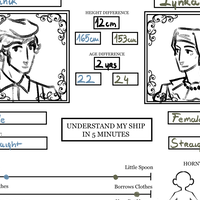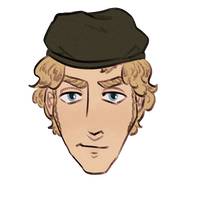Hanik
ObywatelKajen
- Created
- 2 years, 11 months ago
- Creator
- ObywatelKajen
- Favorites
- 9
Profile

HANIK
22 / Male / InsurgentAbout
Favorites
- ✦ Dancing
- ✦ Watching trains depart
- ✦ Spending time w/ friends
- ✦ Apple pie
- ✦ Jokes
Interests
- ✦ Pigeon fancying
- ✦ Collecting knives
- ✦ Playing cards
- ✦ Playing accordion
- ✦ History
Dislikes
- ✦ Going outside w/o hat
- ✦ Germans
- ✦ Analyzing art
- ✦ Coffee
- ✦ Disrespecting traditions
Notes
Blurb
Janusz Dytko (born Johannes Dittrich) is the protagonist of Ballad about Silesia during the 1920s arc. He’s called Hanik, Hanzlik or Janek by his friends and family. Hanik lives in Giszowiec (currently a district of Katowice, Poland) during the interwar period, and works as a miner at the coal mine “Giesche” (KWK “Giesche”; currently KWK “Wieczorek”), which is located in the neighboring Nikiszowiec. He fought in all the Silesian Uprisings, where he met two of his dearest friends; Hanik thinks of himself as a true Polish patriot – he always considered himself a Pole first, then Silesian. Supports most of Wojciech Korfanty’s beliefs.
Hanik was born on March 8th, 1897 to Jadwiga and Edmund Dytko in the suburbs of city of Katowice. He’s the husband of Helena Dytko, who he married in 1923. Together, they had two kids – son Alfred (named after Alfons Alfred Zgrzebniok, the commandant of First and Second Silesian Uprising) and daughter Susie (born in the US after his death). He is a close friend of Marcin, Ernst (even if he often annoys him) and Gynek. They all fought in the uprisings and besides Ernst, they all work at “Giesche”. Gustlik, a kid from Giszowiec, considers the insurgents his idols and wants to be like them when he grows up. Hanik isn’t fond of Germans; that’s why he didn’t get along with Erwin Ziegler, who came to Giszowiec from Cologne to work here.
The man is an optimistic, energetic and extroverted person, who has the habit of doing things before thinking. A bit of happy-go-lucky attitude. He is a very hot-headed person and impulsive individual. Hanik never had problems with making new friends, and after all, he helped Gynek to move to Giszowiec after the third uprising. The miner’s most recognizable appearance trait is a dark greenish-brown flat cap he wears almost daily. Like many other Silesians from these times, he is a pigeon fancier. Hanik is a bright person and usually has a smile on his face – either a pure one or a cocky one. The man definitely listens to his heart more and often follows feelings more than rational thinking.
General Trivia
- ✦ Voice claim (Hańba!) / Theme song.
- ✦ Hanik was popular among his housemates back when he lived in miners' hostel.
- ✦ He is the second smallest male character in the story.
- ✦ Hanik likes Eugeniusz Bodo's music.
- ✦ Hanik doesn't like when people take pictures of him.
- ✦ He loves to stand at the train station and watch the trains depart, it fills him with a lot of longing and nostalgia.
- ✦ His second name – Edmund – was given to him after his father.
- ✦ Good at swimming.
- ✦ His favorite season is winter.
- ✦ Hanik owns a gun.
- ✦ He's a dog person.
- ✦ Attended a church choir as a kid.
- ✦ It was his idea to name his daughter Zosia.
- ✦ Hanik always gives Lynka apples as one of the gifs for their anniversary.
Aesthetic






History
Early life
Johannes Dittrich was born on March 8th, 1897 to Edmund and Hedwig Dittrich (Edmund and Jadwiga Dytko) as their second oldest child, and second son. Edmund worked a miner, and Jadwiga was a housewife. His household tried to keep typical Polish traditions as much as they could, even if at the time Katowice – in which's suburbs Janek was raised – was part of Prussia. While the Dittrich children spoke German in school, they knew Polish as well. As a child, the boy attended the local church choir, as his family was very religious. In 1914, when Janek was only 17, their father got drafted into the army to fight in WW1 and didn't come back. Then the family got Edmund's declaration of death. After that, he and his older by 7 years old brother, Alojzy, had to help their mother in the house or with younger siblings as much as they could. By 1915 Hanik got drafted too – he managed to survive, but couldn't erase the horrors he saw from his mind. Besides Alojzy, Janek had a younger brother (Bernard, b. 1899) and a sister (Erna, b. 1901), although none of the siblings ever had a truly close bond; after being adult enough they all parted their ways, not really keeping in touch. After Jadwiga has died, they lost touch with each other completely. Janek left the house especially early, and he moved to Giszowiec – a new estate build to house workers of coalmine "Giesche" (KWK "Giesche") – to work as a miner. At first, like all unmarried men, he lived in a miners' hostel, where he met Marcin Niedźwiecki. He quickly befriended other men living there and was, in fact, quite popular among them.
the 1920s
Even if he didn't keep in touch with his family, he never forgot how his parents kept raising him in Polish traditions. That's why after Poland regained independence, and the idea of rejoining it with Silesia became very real, in 1919, he decided to fight in the First Silesian Uprising along with Marcin Niedźwiecki and Ewald Aniołowicz. The uprising, however, has failed and Janek, like the rest of the men fighting, had to face deriding and distrust from other people, especially from the German-speaking only citizens of Katowice and Giszowiec. He also lost the chance to get a promotion at work. A year later, the Second Silesian Uprising broke out, but like the first one, it has failed – and Ewald had died. During those battles, Hanik met Ernest Rębacz. Mourning their companion, however, the men never gave up. In 1921, they decided to fight in the Third Silesian Uprising in the Battle of Annaberg, where they met Eugeniusz Myśliwski and Emil Zimowicz. During that time, the insurgent accidentally ran into his older brother – Alojz – who apparently was fighting for Poland too. Not that the man was surprised by this decision, but more by the fact that they met. Especially since they almost never talked to each other after Hanik moved away. Hanik voted for Poland during the plebiscite, and in 1922 their wish became real. A year after that, in 1923, Janek married Helena Ambroz, who he promised before that they'll get married as soon as Silesia becomes Polish. Janek helped Gynek to settle in Giszowiec and was the first one to even suggest him moving here. They worked together and often hanged out after their shift was over. He even let Gynek paint in their garden, as it would be quite hard to do in the miners' hostel.
The 1930s and after the war
Lynka had problems with becoming pregnant, which caused some people in Giszowiec to speculate that Janek was infertile. However, in September of 1933 their first child – a son named Alfred after Alfons Zgrzebniok – was born. Hanik was rapt by this news and really loved his son, imagining a future where he'd raise a cluster of kids with Lynka. Right before World War II, pregnant Lynka ran away to America, where she gave birth to Susie/Zosia in November 1939. Due to his open resistance against Germans in the 1920s, when Third Reich invaded Poland, Janek got killed by Nazis in the early days of September 1939. He got executed by hanging along with his friends, Marcin and Ernest, to show what happens with those who try to resist.
After the war, his name got put on Silesian Insurgents Memorial in Giszowiec (Katowice, Poland) and is here to this day. Through the late 1940s and in the 1950s, he was brought up by Ojgen, Gustlik, or other older residents of after-war Giszowiec sometimes. Ojgen has dedicated one of his paintings to his uprising comrades who didn't manage to survive the war. Even though there isn't left anybody who met him personally, he is still remembered among Giszowians.
Personality
Hanik prides himself on being a Pole, although he considers himself Silesian as well; he was raised in a Polish household and fought for Polish Silesia – without any doubt he can be considered a patriot. Because of Poland regaining independence and the idea of Silesia reuniting with Poland, Hanik promised his love to get married as soon as Silesia is Polish again. The man is a very extroverted person, who never had any problems with making new friends or running out of fun stories and jokes to tell around others. When talking, especially about his favorite topics, he often gesticulates wildly. He can't say he loves his work above all, as it is hard and dangerous, but he likes many aspects of being a miner – Hanik was especially glad for the fact that thanks to it, he can afford food for himself and his family. Due to the relationship he had with his brothers and sister, the man always felt a bit of sorrow when he saw siblings who had a great bond.
He is a bright individual, and he usually has a smile on his face – either a pure one or a cocky smirk. Hanik definitely listens to his heart more and often follows feelings more than rational thinking. And sometimes does or says things before thinking. Things that often have consequences. He concludes people quickly, whenever they are positive or negative – that's why he sometimes doesn't get along with others from the beginning, making opinions based on things he knows at the moment (like his relationship with Erwin; they really didn't get along for first few years, mostly to the fact that Erwin was a German). Even if he is an adult, he likes to pull pranks on people from time to time.
Hanik greatly cares for his friend and family and is loyal to them, as he can sacrifice his own life for theirs (which, in the end, he did). Regardless, he is a very hot-headed person too and can get unnerved quickly, which sometimes results in Hanik getting into fights. He is impulsive as well. During the uprisings, he fought bravely. Might not have listened to the orders once or twice, but he was still a great fighter. The insurgent lays emphasis on traditions, and wants to follow them as much as he can. He's quite religious too.





